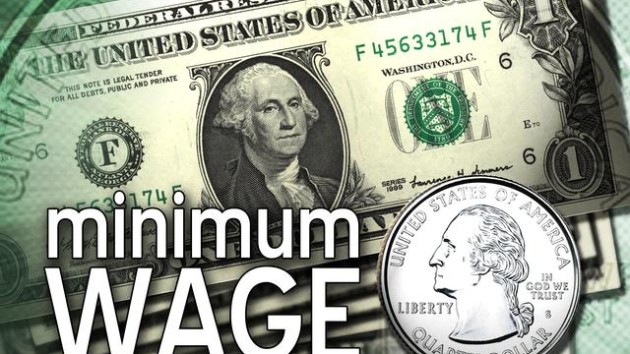Minimum Wage Hike: What you need to know
As Democrats seek to turn attention away from the rollout of ObamaCare and dedicate 2014 to the theme of income inequality, discussions on raising the minimum wage from $7.25 an hour to $10.10 an hour have been gaining ground. The following is what you need to know about raising the minimum wage, adapted from the testimony in front of the Health, Education, Labor and Pensions Committee on June 25, 2013 by James Sherk, a Senior Policy Analyst in Labor Economics at the Heritage Foundation. The testimony transcript can be read in its entirety by clicking here. Other sources will be noted as they are used:
- Didn’t we just raise the minimum wage? The last federal minimum wage hike was voted on in 2007, and phased in throughout 2009. It raised the minimum wage from $5.15 an hour to $7.25 an hour. To raise the minimum wage from $7.25 an hour to $10.10 an hour, as some are suggesting, would be a 40% raise. Talk in Washington of raising the minimum wage began last year when President Obama set it as a policy goal in his State of the Union address:
State of the Union 2013: Obama Wants Minimum Wage: ‘A Wage You Can Live On’
- When was the minimum wage first instituted? Congress instituted a minimum wage in 1938, and since then the inflation-adjusted buying power of the minimum wage has averaged at $6.16 in 2013 dollars. At some points the minimum wage has harnessed less or more buying power than that average, the low being $3.09 an hour in 1948 and $8.67 an hour in 1968. As Sherk noted in his congressional testimony, “Today’s minimum wage buys more somewhat more than the minimum wage has historically, although it remains over a dollar an hour below its historical high.”
- When does Congress raise the minimum wage? Historically, Congress has voted to raise the minimum wage in relatively good economic times. Congress has never voted to raise the minimum wage with unemployment over 7.5% since the Great Depression.
- Who works for the minimum wage? The two groups of people who typically work for the minimum wage are teenagers or young adults who are also in school, and disadvantaged adults over the age of 25. Using U.S. Census Bureau data, Sherk calculated that three-fifths of the teenagers and young adults working minimum wage jobs are enrolled in school and only 22% live at or below the poverty line since they are usually not the breadwinners in their households; three-fourths of older workers earning minimum wage live above the poverty line, because often those workers are married or choose to work part-time.
- How many minimum wage workers are single moms or dads? Only 4% of minimum wage, full-time workers are single parents.
- The minimum wage is a learning wage: Over half of Americans started their careers making within $1 of the minimum wage. Two-thirds of those making the minimum wage receive a raise within a year.
- States have the power to raise their minimum wage if they wish to: James Beattie at CNSNews.com reported two weeks ago that 13 states increased their minimum wage last year, and 14 states and the District of Columbia have bills in their legislatures this year to raise the minimum wage.
- How many Americans only earn $7.25 an hour?Ed Feulner, former President of the Heritage Foundation, wrote last month that only 3% of American workers earn just $7.25 an hour.
- What are the effects of raising the minimum wage? Sherk noted, “The minimum wage especially hurts disadvantaged workers’ job prospects. Higher minimum wages encourage employers to replace less-skilled workers with more productive employees. Given the choice between hiring an unskilled worker for $10.10 an hour and a worker with more experience for the same rate, companies will always choose the more experienced and productive employee.” If the minimum wage is raised, more experience and educated workers will settle for minimum wage jobs, because “Higher minimum wages…make working in such jobs more attractive, drawing greater numbers of workers with outside sources of income into the labor market….[and] they crowd out urban teenagers and disadvantaged adults who would have sought the jobs at the previous wages.”
Bill Gates thinks raising the minimum wage will not help disadvantaged workers:



Trackbacks & Pingbacks
[…] […]
Comments are closed.